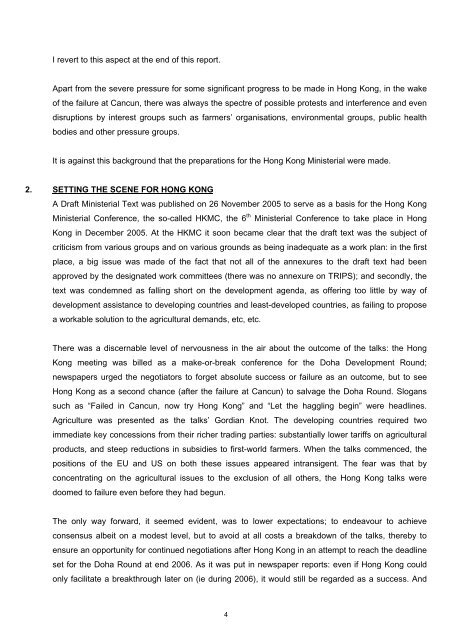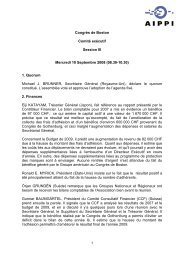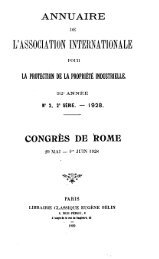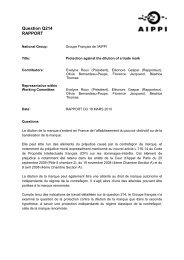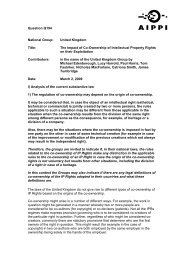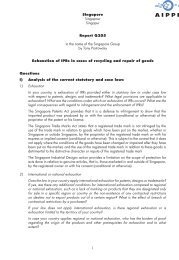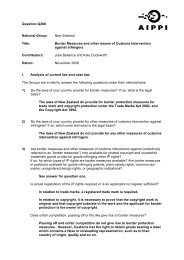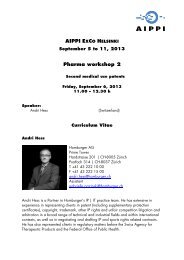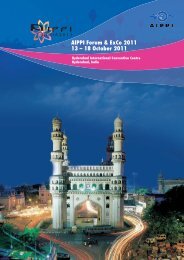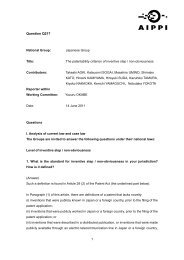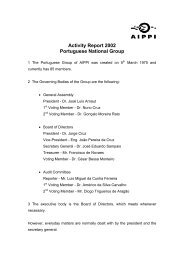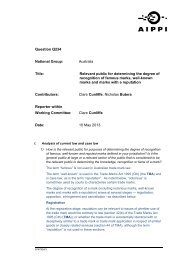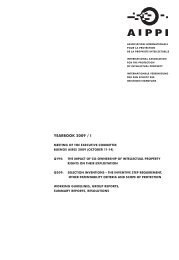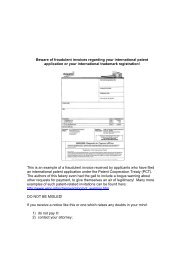Report on the 6th Ministerial Conference of WTO - AIPPI
Report on the 6th Ministerial Conference of WTO - AIPPI
Report on the 6th Ministerial Conference of WTO - AIPPI
Create successful ePaper yourself
Turn your PDF publications into a flip-book with our unique Google optimized e-Paper software.
I revert to this aspect at <strong>the</strong> end <strong>of</strong> this report.<br />
Apart from <strong>the</strong> severe pressure for some significant progress to be made in H<strong>on</strong>g K<strong>on</strong>g, in <strong>the</strong> wake<br />
<strong>of</strong> <strong>the</strong> failure at Cancun, <strong>the</strong>re was always <strong>the</strong> spectre <strong>of</strong> possible protests and interference and even<br />
disrupti<strong>on</strong>s by interest groups such as farmers’ organisati<strong>on</strong>s, envir<strong>on</strong>mental groups, public health<br />
bodies and o<strong>the</strong>r pressure groups.<br />
It is against this background that <strong>the</strong> preparati<strong>on</strong>s for <strong>the</strong> H<strong>on</strong>g K<strong>on</strong>g <strong>Ministerial</strong> were made.<br />
2. SETTING THE SCENE FOR HONG KONG<br />
A Draft <strong>Ministerial</strong> Text was published <strong>on</strong> 26 November 2005 to serve as a basis for <strong>the</strong> H<strong>on</strong>g K<strong>on</strong>g<br />
<strong>Ministerial</strong> C<strong>on</strong>ference, <strong>the</strong> so-called HKMC, <strong>the</strong> 6 th <strong>Ministerial</strong> C<strong>on</strong>ference to take place in H<strong>on</strong>g<br />
K<strong>on</strong>g in December 2005. At <strong>the</strong> HKMC it so<strong>on</strong> became clear that <strong>the</strong> draft text was <strong>the</strong> subject <strong>of</strong><br />
criticism from various groups and <strong>on</strong> various grounds as being inadequate as a work plan: in <strong>the</strong> first<br />
place, a big issue was made <strong>of</strong> <strong>the</strong> fact that not all <strong>of</strong> <strong>the</strong> annexures to <strong>the</strong> draft text had been<br />
approved by <strong>the</strong> designated work committees (<strong>the</strong>re was no annexure <strong>on</strong> TRIPS); and sec<strong>on</strong>dly, <strong>the</strong><br />
text was c<strong>on</strong>demned as falling short <strong>on</strong> <strong>the</strong> development agenda, as <strong>of</strong>fering too little by way <strong>of</strong><br />
development assistance to developing countries and least-developed countries, as failing to propose<br />
a workable soluti<strong>on</strong> to <strong>the</strong> agricultural demands, etc, etc.<br />
There was a discernable level <strong>of</strong> nervousness in <strong>the</strong> air about <strong>the</strong> outcome <strong>of</strong> <strong>the</strong> talks: <strong>the</strong> H<strong>on</strong>g<br />
K<strong>on</strong>g meeting was billed as a make-or-break c<strong>on</strong>ference for <strong>the</strong> Doha Development Round;<br />
newspapers urged <strong>the</strong> negotiators to forget absolute success or failure as an outcome, but to see<br />
H<strong>on</strong>g K<strong>on</strong>g as a sec<strong>on</strong>d chance (after <strong>the</strong> failure at Cancun) to salvage <strong>the</strong> Doha Round. Slogans<br />
such as “Failed in Cancun, now try H<strong>on</strong>g K<strong>on</strong>g” and “Let <strong>the</strong> haggling begin” were headlines.<br />
Agriculture was presented as <strong>the</strong> talks’ Gordian Knot. The developing countries required two<br />
immediate key c<strong>on</strong>cessi<strong>on</strong>s from <strong>the</strong>ir richer trading parties: substantially lower tariffs <strong>on</strong> agricultural<br />
products, and steep reducti<strong>on</strong>s in subsidies to first-world farmers. When <strong>the</strong> talks commenced, <strong>the</strong><br />
positi<strong>on</strong>s <strong>of</strong> <strong>the</strong> EU and US <strong>on</strong> both <strong>the</strong>se issues appeared intransigent. The fear was that by<br />
c<strong>on</strong>centrating <strong>on</strong> <strong>the</strong> agricultural issues to <strong>the</strong> exclusi<strong>on</strong> <strong>of</strong> all o<strong>the</strong>rs, <strong>the</strong> H<strong>on</strong>g K<strong>on</strong>g talks were<br />
doomed to failure even before <strong>the</strong>y had begun.<br />
The <strong>on</strong>ly way forward, it seemed evident, was to lower expectati<strong>on</strong>s; to endeavour to achieve<br />
c<strong>on</strong>sensus albeit <strong>on</strong> a modest level, but to avoid at all costs a breakdown <strong>of</strong> <strong>the</strong> talks, <strong>the</strong>reby to<br />
ensure an opportunity for c<strong>on</strong>tinued negotiati<strong>on</strong>s after H<strong>on</strong>g K<strong>on</strong>g in an attempt to reach <strong>the</strong> deadline<br />
set for <strong>the</strong> Doha Round at end 2006. As it was put in newspaper reports: even if H<strong>on</strong>g K<strong>on</strong>g could<br />
<strong>on</strong>ly facilitate a breakthrough later <strong>on</strong> (ie during 2006), it would still be regarded as a success. And<br />
4


